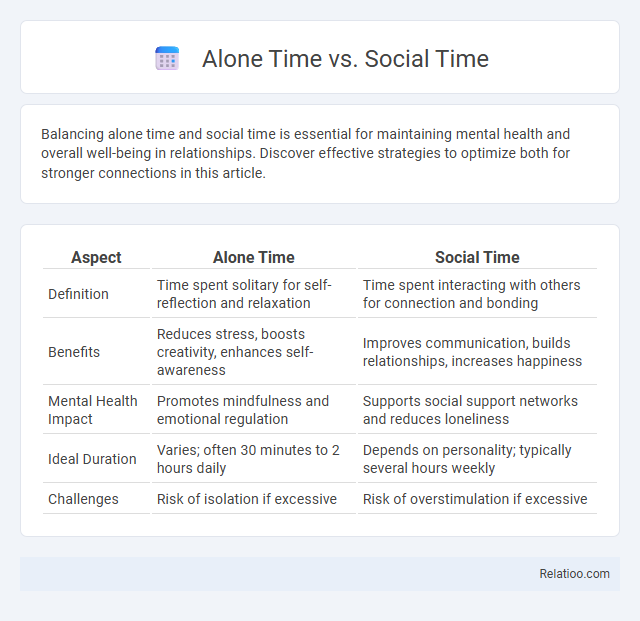Balancing alone time and social time is essential for maintaining mental health and overall well-being in relationships. Discover effective strategies to optimize both for stronger connections in this article.
Table of Comparison
| Aspect | Alone Time | Social Time |
|---|---|---|
| Definition | Time spent solitary for self-reflection and relaxation | Time spent interacting with others for connection and bonding |
| Benefits | Reduces stress, boosts creativity, enhances self-awareness | Improves communication, builds relationships, increases happiness |
| Mental Health Impact | Promotes mindfulness and emotional regulation | Supports social support networks and reduces loneliness |
| Ideal Duration | Varies; often 30 minutes to 2 hours daily | Depends on personality; typically several hours weekly |
| Challenges | Risk of isolation if excessive | Risk of overstimulation if excessive |
Understanding Alone Time and Social Time
Alone time is essential for self-reflection, mental rejuvenation, and processing thoughts without external influence, promoting emotional balance and creativity. Social time involves interacting with others, fulfilling the human need for connection, support, and collaboration, which enhances mood and reduces stress. Understanding the balance between alone time and social time helps optimize personal well-being and meets individual psychological needs effectively.
Psychological Benefits of Alone Time
Alone time fosters psychological benefits by enhancing self-awareness, reducing stress levels, and promoting emotional regulation, leading to improved mental health. Balancing alone time with social interactions supports cognitive functioning and resilience, while personal needs reflect the essential role of solitude in restoring psychological well-being. Prioritizing alone time enables deeper introspection, creativity, and a stronger sense of identity, crucial for long-term emotional balance.
The Importance of Social Interactions
Social interactions play a crucial role in mental health by reducing stress, enhancing mood, and fostering a sense of belonging. Studies from the American Psychological Association show that regular positive social engagement lowers risks of depression and anxiety. Balancing alone time with meaningful social connections supports emotional resilience and overall well-being.
Balancing Solitude and Socialization
Balancing solitude and socialization involves recognizing the importance of alone time for mental recharge, creativity, and self-reflection, while also valuing social interactions that support emotional well-being and interpersonal growth. Understanding personal needs helps tailor the ideal ratio of solitude and social time, enhancing productivity and reducing stress. Prioritizing this balance fosters overall psychological health and strengthens relationships by ensuring both self-care and meaningful social connections.
Signs You Need More Alone Time
Feeling consistently drained after social interactions, increased irritability, and difficulty concentrating are clear signs you need more alone time. Experiencing a strong urge to retreat and recharge, craving solitude for mental clarity, or sensing emotional overwhelm indicates personal needs outweigh social engagement. Recognizing these signs helps balance social time and personal well-being, improving mental health and overall life satisfaction.
Recognizing the Need for Social Time
Recognizing the need for social time is essential for maintaining mental health and emotional well-being, as human connection significantly reduces stress and boosts happiness. You should balance alone time and social interactions to fulfill your personal needs effectively, ensuring that neither isolation nor overstimulation dominates your lifestyle. Prioritizing social time helps to foster relationships, enhance communication skills, and improve overall life satisfaction.
Personality Types: Introverts vs Extroverts
Introverts often require more alone time to recharge, aligning closely with their need for introspection and personal reflection, whereas extroverts thrive on social time that stimulates their energy through interaction. Your personality type influences how you balance personal needs: introverts prioritize solitude for mental restoration, while extroverts seek social engagement to fulfill their emotional wellness. Understanding this dynamic helps optimize well-being by respecting your unique blend of alone time, social time, and personal needs.
Methods to Maximize Alone Time
Maximizing alone time involves setting clear boundaries by scheduling specific periods dedicated solely to yourself, ensuring distractions are minimized through techniques like digital detox or creating a quiet environment. Establishing routines such as mindfulness meditation or journaling can enhance the quality of your personal time, contributing to better mental clarity and emotional balance. Prioritizing your alone time within your overall social commitments allows you to recharge effectively, ultimately improving your productivity and personal well-being.
Enhancing Social Experiences
Balancing alone time, social time, and personal needs is essential for enhancing your social experiences and emotional well-being. Prioritizing moments of solitude allows you to recharge and reflect, which improves your ability to engage meaningfully with others. Fostering quality social interactions enriched by your clearer mindset and self-awareness leads to deeper connections and more fulfilling relationships.
Finding Your Ideal Balance
Finding your ideal balance between alone time, social time, and personal needs requires understanding how each aspect affects your mental and emotional well-being. Alone time helps recharge your energy and fosters self-reflection, while social time nurtures relationships and improves communication skills. Prioritizing personal needs ensures you maintain a healthy lifestyle tailored to your unique preferences and goals.

Infographic: Alone Time vs Social Time
 relatioo.com
relatioo.com